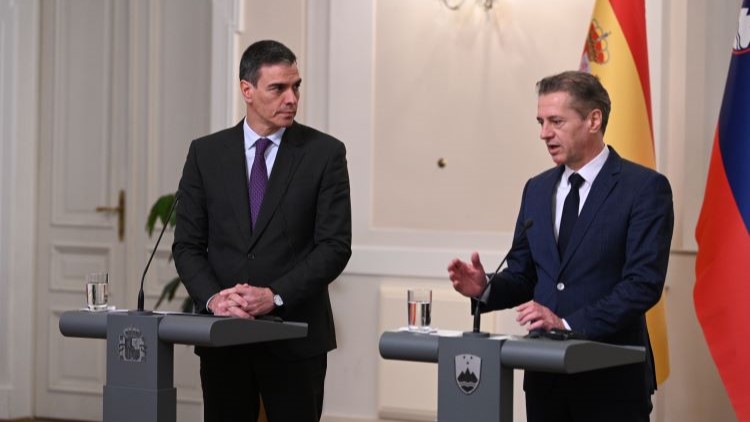Eduardo González
The President of the Government, Pedro Sánchez, and the Prime Minister of Slovenia, Robert Golob, confirmed yesterday in Ljubljana their decision to recognize the Palestinian State “when the circumstances arise” and announced that both countries will support this same week before the Security Council of the UN the access of Palestine as a “full member” in the United Nations.
Sánchez was received by Golob within the framework of his new tour of various European capitals to obtain the support of other European leaders for the recognition of the Palestinian State, which has become one of his great priorities in foreign policy. Last week, the President of the Executive obtained the support of the Prime Minister of Norway, Jonas Gahr Støre, and confirmed the accession of the new Prime Minister of Ireland, Simon Harris, who remained in the same line as his predecessor, Leo Varadkar.
Separately, Sánchez received this Monday the newly appointed Prime Minister of Portugal, Luis Montenegro, who also supported the recognition of the State of Palestine but did not want to join the President of the Government’s intention to take this step before July and showed his preference for achieving it sooner. an “international consensus” within the EU and the UN. The current tour will conclude in Brussels, where Pedro Sánchez will meet with the Prime Minister, Alexander de Croo, and will participate in the European Council. De Croo (whose country currently holds the rotating presidency of the EU) and Sánchez traveled to Israel, Palestine and Egypt at the end of November, on the Prime Minister’s first tour to the region since the beginning of the escalation in Gaza.
In Slovenia, Pedro Sánchez already had a good part of the ground laid, since Golob was, along with Sánchez himself, Leo Varadkar and the Prime Minister of Malta, Robert Abela, one of the four signatories of the declaration of March 22 in which they committed to recognizing the State of Palestine when “the appropriate circumstances arise.”
In this regard, Sánchez took advantage of the statement before the media (without questions) to “thank Slovenia for its commitment, courage and coherence to find a peaceful solution to a conflict that stirs our conscience.” “Slovenia’s vote in the UN Security Council, Slovenia’s voice in the European Council” and the aforementioned declaration of March 22 “demonstrate that coherence, bravery and courage of Slovenia,” he added.
According to the head of the Executive, after “more than six months of attacks and bombings”, the entire region is looking “into the abyss due to the wrong decisions of a few”, as “we have seen in the last few hours”. In that sense, he continued, both he and Golob agreed to express their “total condemnation, with resoundingness and clarity,” of the attack carried out this past weekend by Iran against Israel, which represents “one more example of the risk we face.”
For this reason, Sánchez reiterated that, in this situation, there are “two paths: escalation, with its horizon of misery, pain and resentment, or the commitment to international legality and diplomacy, the only path to peace and security.” sustainable in one of the most important regions for international stability.”
“We have chosen that second path” and, therefore, the two countries agreed on the need for “an immediate ceasefire, respect for International Humanitarian Law, access for humanitarian aid” and a “political horizon perspective.” “to solve the conflict through a two-state solution.”
“To facilitate this solution, (the two countries) will support this week the accession of Palestine as a full member of the UN (during the debate that will take place this Thursday in the Security Council, in which the Minister of Foreign Affairs, José Manuel Albares, will intervene) and we will recognize the Palestinian State when the circumstances arise,” added Pedro Sánchez, who expressed his hope that this decision will contribute to “other Western countries doing so” and moving towards “a political process between equals.” that leads to a just and lasting peace.”
For his part, Robert Golob assured in the statement to the media that the position of both countries is “practically identical” and warned, without further details, that “the recognition of the Palestinian State is one of the steps we have to follow, that is the first, but it is not the only one.” Regarding the date for the recognition of the Palestinian State (Pedro Sánchez has proposed doing so before July), the prime minister limited himself to specifying that, “when the most appropriate time is, we will make the decision.” “I don’t like to set times, any schedule; when there is greater agreement in this situation, we will take the step,” he added.
Separately, at the bilateral level, Golob announced that, at the next summit between Spain and Slovenia, which will take place “between September or October”, the two countries will address “commercial exchange and political exchange.”
Australia
On the other hand, Pedro Sánchez had a telephone conversation yesterday with the Prime Minister of Australia, Anthony Albanese, in which he defended the two-state solution, because “it is the only possible way to achieve a just and lasting peace. It is time to move from words to action,” as he wrote on the social network X. The Australian Government also supports the two-state solution and, therefore, the recognition of Palestine. However, its Foreign Minister, Penny Wong, declared last week that the Government has not yet decided whether to take that step now.







